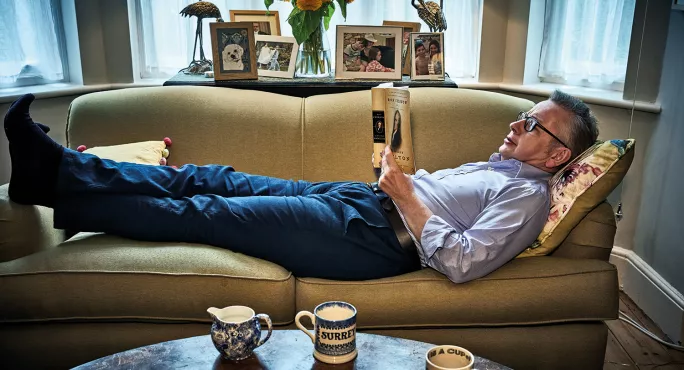- Home
- Michael Gove profile: ‘There’s nowhere I can look back and think it was a big mistake‘
Michael Gove profile: ‘There’s nowhere I can look back and think it was a big mistake‘

This profile was first published in Tes magazine on March 31, 2017.
Michael Gove casts a long shadow over today’s schools system. Halfway through his first education interview since leaving Sanctuary Buildings, Tes mentions just how often the former education secretary’s name still crops up in the sector - particularly among teaching union leaders.
“In affectionate terms?” he cackles. “Like Take That fans wanting the band to reform?”
Gove looms large for two reasons: because his four years steering education were characterised by a blizzard of changes and because his personal style divided opinion.
But what exactly is his legacy? England’s position in the 2015 Programme for International Student Assessment (Pisa) league tables has barely moved. Does that mean Gove’s hyperactivity in office was in vain? Is it just too early to see the fruits of his labour? Or did he, as his critics maintain, bequeath a fragmented education system that his successors will spend years piecing back together?
Meeting in a hotel café in Dubai after an appearance at the Global Education and Skills Forum, Gove hesitates when asked to single out his most important reform.
“Everything fitted together,” he says delicately. “I remember once being asked by Graham Stuart, the forensically skilled chairman of the Education Select Committee, ‘Where’s the coherence on this?’
“I said ‘The coherence comes at the end.’”
He reels off a long list of changes prompted while he was in office: “Updating the national curriculum, changing qualifications, both vocational and academic, introducing the English Baccalaureate, allowing new free schools to be created and allowing schools to convert to academy status and expand, changing the way teacher training was provided… plus the pupil premium and the establishment of the Education Endowment Foundation.”
Gove argues that all of these reforms encapsulate the idea of “raising the bar and closing the gap” - lifting standards and driving a higher level of ambition, particularly for disadvantaged children, whom he claims were too often patronised by the education system.
No ‘big mistakes’
He admits to “tactical snafus” during his time as education secretary - and has apologised in the past for the “crass and insensitive” way he handled the axing of Building Schools for the Future, when he read out a list of cancelled projects in Parliament that contained errors. But Gove strikes a defiant je ne regrette rien attitude when it comes to policy decisions.
“There’s nowhere I can look back and think it was a big mistake,” he states. “Of course there were things that I handled maladroitly, but no big policy area that I would want to see changed.”
Gove does, however, mention the creation of a single exam board as a challenge that he would have liked to have taken further.

“I said at the time that we’d bitten off more than we could chew,” he reflects. “It would have been great to have had that market reform, but there we go. Maybe it will happen at some point in the future.”
What would have come next had prime minister David Cameron not shuffled him out of education in July 2014? Gove is sanguine, saying that “most of what Nicky [Morgan] and Justine [Greening] have done are things that I would have done”. Further academisation, pressing ahead with the national funding formula, and encouraging private schools and universities to “do more in order to support state education” were all in his policy pipeline.
Gove claims that attempts to contrast his tenure as education secretary with that of his two successors are overblown.
“I think that there’s always a desire on the part of commentators - entirely understandable, I’m one myself now - to say ‘well, Fred’s different from Frida in this way’. I haven’t heard anything that Justine has said on education with which I can disagree.” (He once described new grammars as a “distraction”, but has indicated that he now backs their expansion.)
But if his policies didn’t differ much from that of his successors, the way he went about selling them did. Gove was an education secretary who many teachers loved to hate, and it was these negative public perceptions that persuaded the prime minister to replace him with the more emollient Morgan.
Happy to be the ‘bogeyman’
So how does he feel about being seen as a bogeyman by many people in the profession, even now? “Almost every education secretary - there are one or two exceptions - inspires some opposition and criticism, and the longer you’re in office, the more intense it becomes,” he replies breezily.
“The interesting thing is to ask any union general secretary, ‘Who is the best education secretary and why?’ If they are going to reflect on ones they liked, it was often because they didn’t do very much!” he laughs.
Gove insists that his relationships with union leaders were not entirely negative: “No matter how irritated they may have seemed publicly, it was always the case that we could have good private conversations.”
That’s not quite how NEU joint-general secretary Mary Bousted remembers it. “He could be extremely charming,” she says, “until you said something that he didn’t agree with and then I’ve never seen anybody lose it so quickly.
“He would go red in the face and, very unusually, we did have more than one stand-up row. I remember once telling him that he wasn’t behaving very well.”
Considering the stridency of some of his language, which he doesn’t regret, it’s unsurprising that Gove’s approach courted opposition. But the opprobrium isn’t universal - he’s a Marmite figure who has passionate supporters as well as detractors.
While Sir Michael Wilshaw, the former Ofsted chief inspector, ended up having his differences with Gove, he still calls him an “inspirational figure”.
“I’m a big supporter,” he says. “I don’t like people running him down.”
On the question of his legacy, Gove claims it will take time for the effect of his policies to feed through into indicators such as the Pisa rankings, but he argues that “comparator countries” such as Wales and Scotland have already declined relative to England.
He points to a “consensus” among education experts that quality has improved in the last five or six years.
“Quite rightly, most of the credit for that goes to teachers themselves, but at the very least, we didn’t impede that progress as much as some people might have said.
“Maybe the government might get some credit for helping that progress occur?”
He’s able to offer a more definitive answer to the question of whether he’d have a second stint as education secretary if offered the chance. “I don’t think so, no,” he considers. “I had four years doing it, I wouldn’t like - six years after I was appointed - trade union leaders to suffer another nervous moment. I have too much regard for their health and welfare to want to inflict that on them.
“I had my years on the ship and now it’s under different captaincy.”
Want to keep up with the latest education news and opinion? Follow Tes on Twitter and like Tes on Facebook
Keep reading for just £1 per month
You've reached your limit of free articles this month. Subscribe for £1 per month for three months and get:
- Unlimited access to all Tes magazine content
- Exclusive subscriber-only stories
- Award-winning email newsletters



